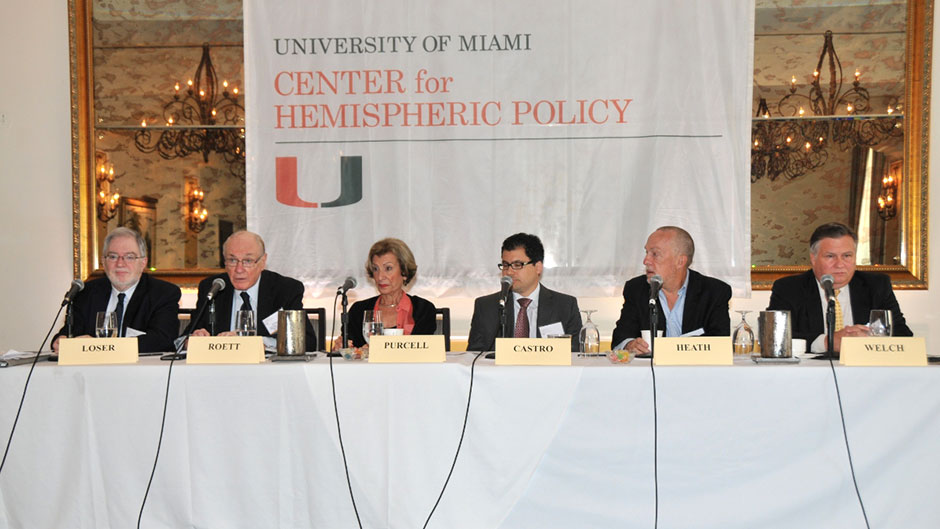Although poverty was reduced significantly in the past decade and the region enjoyed an economic boom due to its exports of commodities, Latin America right now is the slowest growing region in the world.
That was the assessment of Claudio Loser, president of Centennial Group Latin America in Washington, D.C., who was part of a panel called “Modernizing Latin Americas’ Economies: Needed Reforms Spur Growth.”
Hosted by the University of Miami’s Center for Hemispheric Policy, the forum was moderated by center director Susan K. Purcell and was held at the Westin Colonnade Hotel in Coral Gables on September 25.
“We are highly dependent on commodities and that is both a blessing and a curse,” said Loser.
The recent decline in the price of commodities has led to a downturn in the Gross Domestic Product per capita in the region, and could lead to a decrease in the growth of the middle class in many countries, he said. Inflation, he added, is also increasing.
“All American economies are slowing down,” he said. “But there is no other region that has seen such as sharp decline in growth as Latin America.”
Loser warned that leaders in the region should not fall into complacency but should embrace change that could boost productivity and lead to better handling of its economies.
One major stumbling block for the improvement of the region is its political and institutional reality, said Riordan Roett, professor and director of the Paul H. Nitze School of Advanced International Studies at Johns Hopkins University.
“From a distance Latin America is quite possible, but behind the façade…we find that Latin American institutions are found wanting,” he said. Many countries are marked by a “very low level of the rule of law, impunity to crime and administration of justice is found wanting.”
Although there are some exceptions to the rule and countries like Guatemala and Brazil have started to prosecute government officials involved in major corruption scandals, he said, there is still a prevalent spirit that favors “caudillismo” or the old form of government where the leader was the supreme authority and considered above the law.
As an example, he noted Bolivian President Evo Morales’ recent attempts at altering the constitution so he could run for another term in office. He also noted that Venezuela, a failed state, has just sentenced opposition leader Leopoldo Lopez to a 13-year jail sentence for leading peaceful demonstrations.
Mexico has its own set of problems with matters of impunity, said Roett. The disappearance of 43 students in the state of Guerrero last year and the government‘s lack of clarity surrounding that investigation and prosecution of those linked to that event has proven problematic.
Several of the panelists emphasized that countries needed to expand educational opportunities and the accessibility to good educational institutions to help the region overall by boosting the number of workers who could enter the formal economy, increase productivity and also become informed citizens that could demand better institutions.
“Only educated people can make educated decisions about who should represent them,” said Roett. “The low levels of education in Latin America tells us that we have a long way to go.”
Mario Castro, vice president of Latin America Strategy for Nomura Securities, chose to be “hopeful” about Latin America. He cited several social and economic reforms in Colombia and Peru that could pave the way for an improved society. These reforms included educational reforms in Colombia that would provide 10,000 scholarships a year to low-income students.

